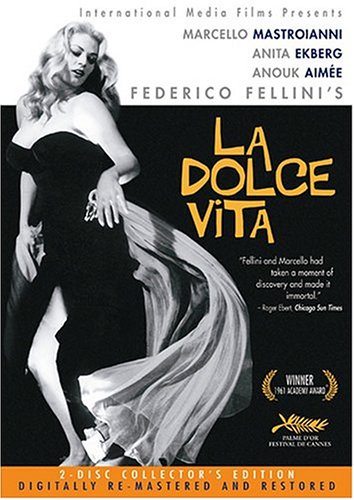|
Reviews of Recent Independent, Foreign, & Documentary Films in Theaters and DVD/Home Video
LA DOLCE VITA
DVD Features: Two Discs. Introduction by director Alexander Payne. Commentary by film critic/historian Richard
Schickel. Fellini TV: Collection of Fellini Shorts. "Remembering the Sweet Life": Interviews with Marcello
Mastroianni & Anita Ekberg. "Cinecitta: The House of Fellini," Musical Montage of Fellini's Studio. "Fellini, Roma,
and Cinecitta": An Interview with Fellini. Restoration Demo. Biographies. Filmographies. Photo gallery. English &
Spanish subtitles. Italian & English Audio. Eight-page collector's booklet.
Watching this 1960 masterpiece, one is struck by its pungent desperation and alienation. Society news hound
Marcello (an entirely naturalistic Marcello Mastroianni) goes from one adventure to another on his ill-defined quest
for something in which to believe (such as respectability and/or affection). His meandering - and that of the film,
with its episodic, segmented structure - is endemic of his surroundings. This is hinted at in the depiction of the
characters' need to worship, whether that is of religion, love, wealth, or celebrity. The film's provocative mixture of
realism with spectacle culminates in a surrealistic meditation on the absurd nature of life.
From the statue of Christ hanging below a hovering helicopter to composer Nino Rota's luminously gentle score, the
movie is filled with wild juxtapositions as the decadence of high society is examined. Its characters are searching for
escape - which accounts for the excessive alcohol consumption on display. (An orgy scene showing Marcello
drunkenly riding a fellow partygoer as if she were a horse is shocking even today).
DVD Extras: In his introduction, director Alexander Payne (Sideways) perceives
Federico Fellini's directorial style as modernly novelistic. Film critic/historian Richard Schickel also casts
La Dolce Vita as a critique of old-fashioned institutions. Nevertheless, Schickel says the
film is nostalgic for traditional belief systems - which some viewers may interpret as a statement
about the fundamental flaw of needing faith, placing the movie in a more postmodern context
than Schickel identifies. Additionally, he stresses that there is no psychological motivation
provided for Marcello because the motive isn't clear even to Marcello.
Fellini's TV commercial clips (outtakes from his Ginger and Fred [1986]) are bizarrely remarkable since it is difficult to tell if they are real advertisements or not.
As for the Fellini interview, it is only interesting to hear how he links his studio, Cinecittà, and the city of Rome in
his mind. Finally, the interviews with Anita Ekberg and Mastroianni provide a touching glimpse
of the stars watching themselves onscreen in the film many years later. Reymond Levy
|
